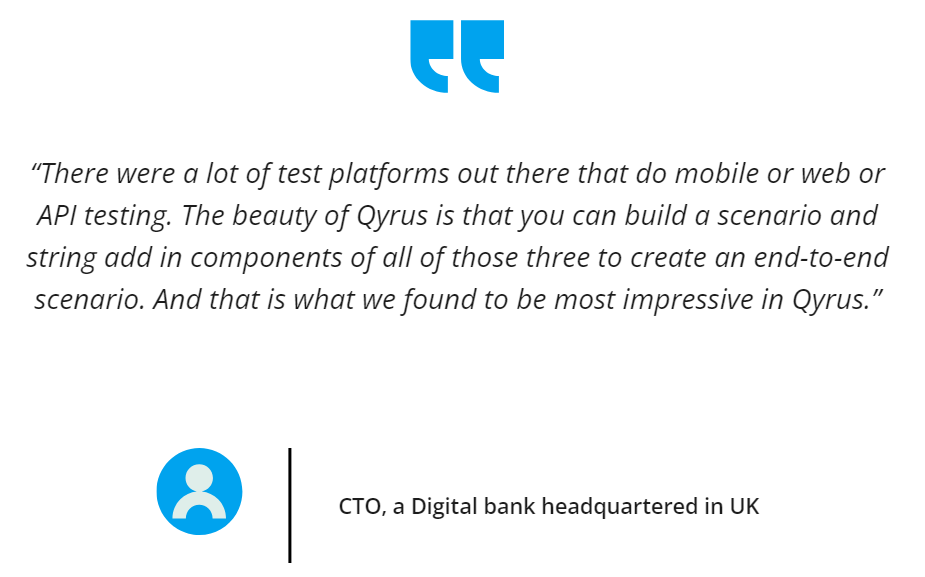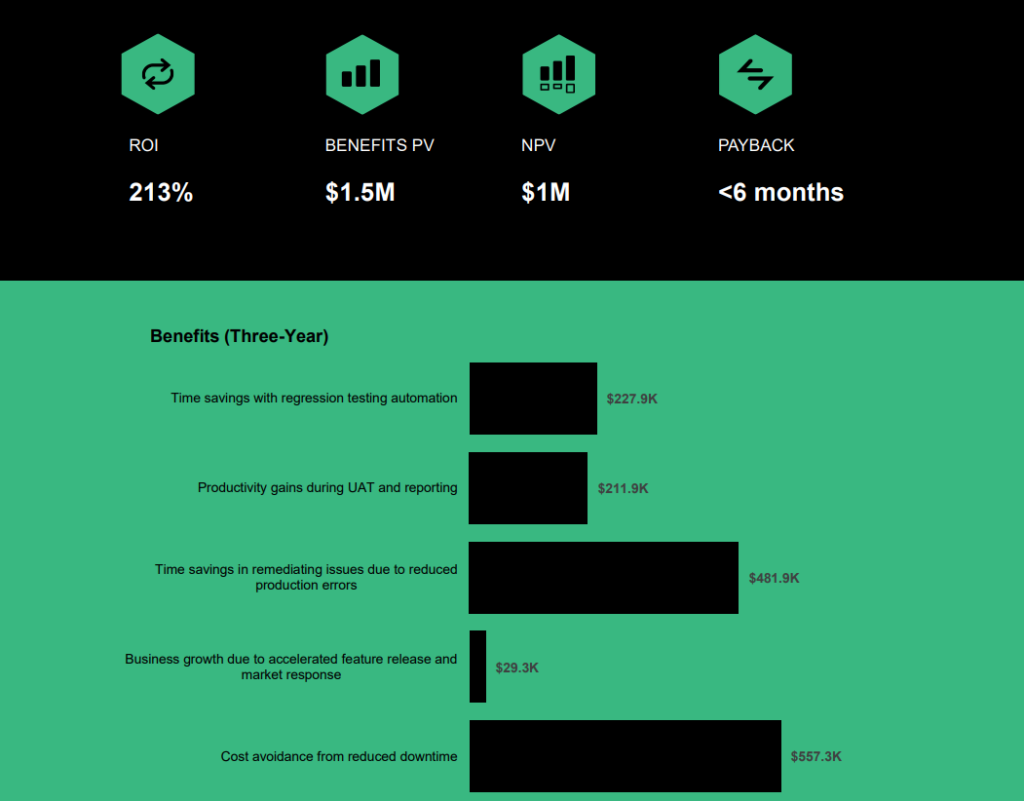Accelerate IT operations with AI-driven Automation
Automation in IT operations enable agility, resilience, and operational excellence, paving the way for organizations to adapt swiftly to changing environments, deliver superior services, and achieve sustainable success in today's dynamic digital landscape.
Driving Innovation with Next-gen Application Management
Next-generation application management fueled by AIOps is revolutionizing how organizations monitor performance, modernize applications, and manage the entire application lifecycle.
AI-powered Analytics: Transforming Data into Actionable Insights
AIOps and analytics foster a culture of continuous improvement by providing organizations with actionable intelligence to optimize workflows, enhance service quality, and align IT operations with business goals.
“Did you know? According to Adenza, the use of CATT can decrease test execution times by up to 70%”
In today’s competitive digital landscape, businesses constantly seek ways to optimize operations, reduce costs, and drive innovation. Testing is a critical part of this process, but traditional methods often fall short in keeping up with the complexity and speed of modern software development. This is where advanced testing solutions come into play, and the Total Economic Impact™ (TEI) report provides data-driven insights into the tangible benefits of these solutions.
Quinnox recently commissioned Forrester Consulting to conduct a TEI study to examine the potential return on investment (ROI) enterprises may realize by deploying Qyrus, an advanced testing platform. The goal of this study is to create a framework that helps organizations evaluate the financial impact Qyrus can have on their operations. The TEI report highlights the significant changes Qyrus can drive in testing efficiency, resource optimization, and strategic decision-making.
In this blog post, we will explore five impactful ways that findings from this TEI report can help transform your business, offering not just a roadmap for better testing but also strategic insights for overall business improvement.
1. Addressing the Complexity of Modern Applications
Modern software applications are becoming increasingly complex, often integrating across multiple platforms and involving intricate backend systems. This growing complexity makes thorough testing more critical than ever. Advanced testing solutions like Qyrus allow organizations to simulate real-world scenarios, ensuring that all components of an application are tested for reliability and performance.
The TEI report emphasizes how Qyrus effectively addresses the complexity of modern applications by reducing the likelihood of defects and ensuring seamless user experiences. This results in improved product stability and protects the company’s reputation. Preventing failures not only saves on costly fixes but also preserves the trust customers have in your products.
2. Optimization of Resources
Efficiency is key in today’s fast-paced business environment. Organizations must ensure that their resources are used optimally to deliver maximum value. Advanced testing platforms help identify potential issues early in the development process, allowing teams to focus on building and enhancing features rather than fixing problems. According to the TEI report, automating testing processes with Qyrus led to an average annual savings of 13,711 hours by reducing incidents that required fixes. These saved hours can be reallocated to strategic projects that drive innovation and growth, making resource optimization not just a possibility but a reality.
3. Significant Time Savings
Time is a valuable asset, and Qyrus helps businesses make the most of it by automating testing processes. This automation reduces the time spent on manual testing, freeing up teams to focus on innovation and strategic initiatives. For example, by streamlining User Acceptance Testing (UAT) processes and reporting, Qyrus accelerates development cycles and improves overall productivity. The TEI report indicates that testing teams could save up to 50% of their time, enabling them to contribute more directly to the organization’s core objectives and ultimately deliver products to market faster.
4. Scalability and Flexibility
As organizations grow, their testing needs evolve, making scalability a critical factor in choosing a testing platform. Qyrus offers the scalability to manage larger, more complex testing scenarios without the need to overhaul existing testing strategies completely. This adaptability allows organizations to respond quickly to new challenges and opportunities, maintaining agility and competitiveness in a dynamic market. The TEI report underscores the importance of having a flexible and scalable testing solution like Qyrus that can grow with the organization, ensuring that testing processes remain efficient and effective.
5. Enhancing Decision-Making with Data-Driven Insights
In the age of big data, making informed, data-driven decisions is crucial for business success. Advanced testing solutions provide critical insights into the testing process, helping businesses allocate resources effectively and improve processes. Qyrus’s efficient reporting capabilities are a prime example. The TEI report highlighted how Qyrus reduced the time required to create reports from one hour to just six minutes. This efficiency not only saves time but ensures that decision-makers have timely, accurate information to guide their strategies. Real-time insights from Qyrus’s dashboard enable teams to monitor testing progress and outcomes, facilitating faster, more informed decision-making.
The TEI Framework: A strong Approach to Evaluating Impact
Understanding the Total Economic Impact™ Study

Key Findings from the TEI of Qyrus Study: A Closer Look
Key Findings from the TEI of Qyrus Study: A Closer Look
Forrester’s TEI framework can help organizations evaluate the impact of a testing solution like Qyrus by examining four key areas: cost, benefit, flexibility, and risk. This end-to-end approach ensures that all potential impacts are considered, providing a clear picture of the return on investment.
- Cost: Implementing an advanced testing platform incurs costs, including licensing, integration, and ongoing management. However, the time savings and efficiency gains achieved through automation can offset these costs. For example, the reduction in manual testing efforts and the streamlined reporting process can lead to significant productivity gains. With average fully burdened hourly rates for software developers and QA testers at $55 and $36 respectively, these efficiencies translate into substantial cost savings.
- Benefit: The primary benefit of a solution like Qyrus is its ability to maintain high quality and reliability in software products. By reducing defects and minimizing incidents, organizations can improve product stability and customer satisfaction. The TEI report showed that Qyrus reduced defects and incidents by up to 80%, highlighting its effectiveness in delivering high-quality outcomes.
- Flexibility: A flexible testing platform is crucial for adapting to changing business needs. As organizations scale or shift their focus, the ability to quickly adapt testing processes is vital. Qyrus provides this flexibility, allowing companies to tailor their testing approaches to meet specific requirements without sacrificing efficiency or quality.
- Risk: Every investment comes with risk, but advanced testing platforms help mitigate these risks by identifying potential issues early. By catching problems before they reach production, Qyrus helps prevent costly downtime and protects the organization’s reputation. The time savings in incident fixes, as highlighted in the TEI report, further emphasize how proactive issue detection can lead to fewer disruptions and more stable operations.
- Cost Avoidance from Reduced Downtime: Qyrus’s AI-driven detection capabilities prevent 50% of incidents from entering production, leading to cost savings of $557,000 by avoiding downtime.

The Strategic Advantage of Qyrus
Qyrus exemplifies how an advanced testing platform can transform an organization’s approach to software development. The TEI report on Qyrus highlighted several areas of impact:
- Facilitating Growth and Innovation: By optimizing testing processes, Qyrus frees up resources that can be redirected towards innovation. This is crucial for organizations looking to stay competitive and capitalize on new opportunities. The ability to quickly and efficiently bring new features to market allows businesses to respond to customer needs and industry trends, driving growth and long-term success.
- Improved Business Growth and Market Response: Qyrus contributes to broader business objectives, particularly in terms of growth and market agility. Faster time-to-market capabilities allow organizations to be more responsive to market trends and customer feedback, providing a significant competitive advantage. Consistently delivering high-quality products and responding swiftly to customer needs enhances customer satisfaction and loyalty, driving revenue growth and opening new revenue streams.
3. Advanced Reporting and Analytics
Wrap Up
The TEI report on Qyrus provides a compelling case for how advanced testing platforms can transform a business. From optimizing resources and saving time to enhancing decision-making and facilitating growth, Qyrus offers a robust solution that drives significant business impact. By leveraging the insights and capabilities highlighted in the TEI report, organizations can not only improve their testing processes but also achieve broader strategic objectives, ensuring long-term success and competitiveness in the market.
Discover how Qyrus can unlock better testing, improved efficiency, and stronger ROI for your business. Download the comprehensive TEI report here.
